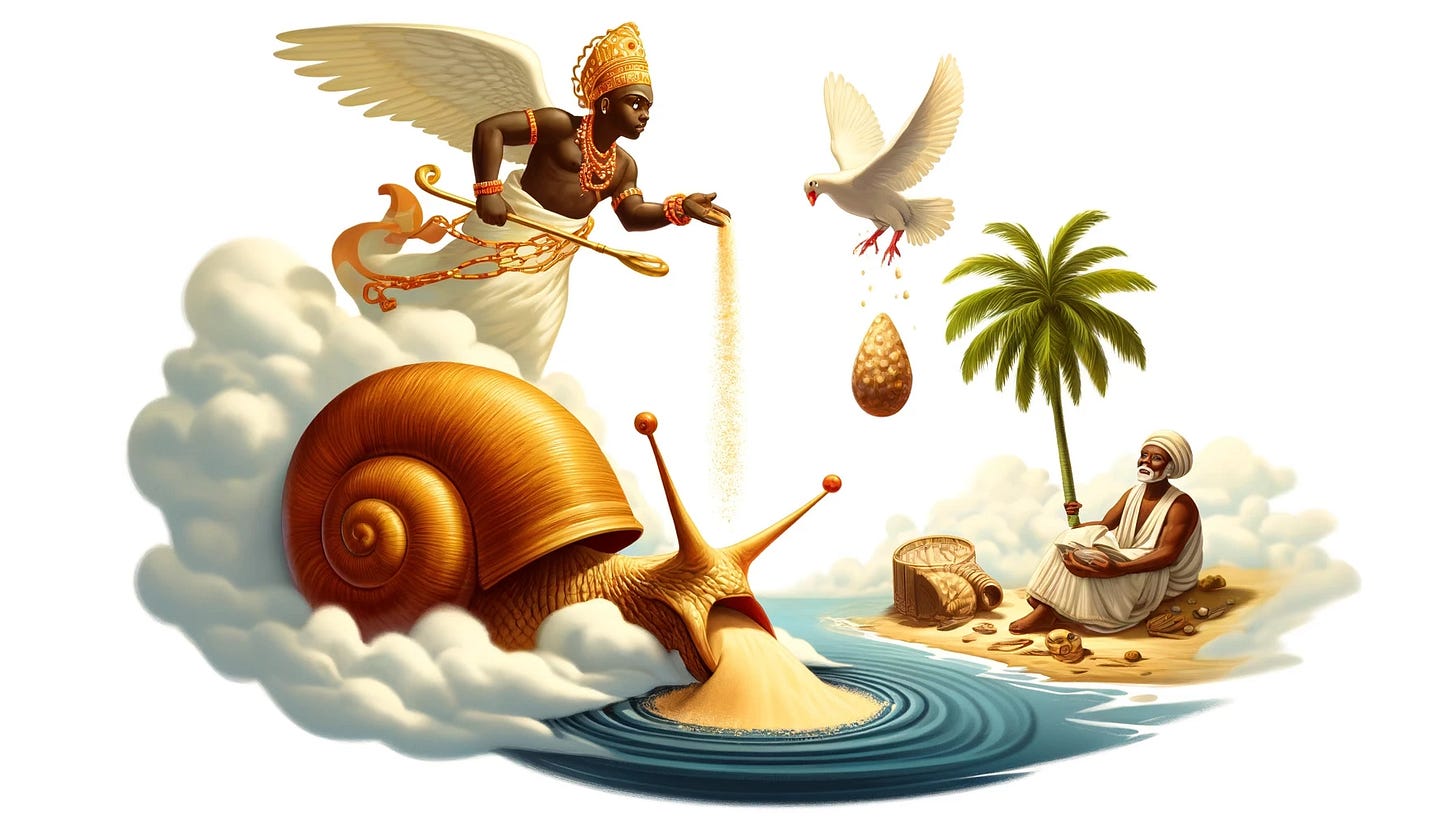Unveiling the Myths of Creation Across African Traditions
Discover the Myths of Creation from Angola, Nigeria and Benin
Dear readers;
Welcome to our latest newsletter, where we delve into the rich tapestry of creation myths from the distinct ethnic traditions of Angola, Nigeria, Benin, and the Congo, and explore their profound influence on the spiritual traditions in the African diaspora. These ancient stories, passed down through generations, form the backbone of African diasporic religions such as Vodou, Santería, Candomblé, and more. By understanding these creation myths, we gain deeper insights into how these beliefs have traveled and transformed across continents, enriching spiritual practices in the Americas and beyond.
Angola: The Creation Myth of the Kongo People
In the traditions of the Kongo people of Angola, the world was created by Nzambi Mpungu, the supreme deity. According to their myth, Nzambi Mpungu first created the heavens and the earth. The earth was a chaotic, watery void until Nzambi Mpungu molded it into a habitable place. He then created the first man and woman, bestowing upon them the knowledge and tools necessary for survival. The Kongo believe that Nzambi Mpungu continues to watch over the world, intervening in human affairs through lesser spirits known as Nkisi.
Nigeria: The Yoruba Creation Story
The Yoruba people of Nigeria have a rich creation myth centered around the deity Olodumare, the supreme god. According to Yoruba mythology, Olodumare sent Obatala, one of the Orishas, to create the earth. Obatala descended from the heavens on a golden chain, carrying with him a snail shell filled with sand, a white hen, and a palm nut. He poured the sand on the primordial waters and let the hen scatter it, creating the land. Obatala then planted the palm nut, which grew into a tree, providing the first food for humanity. Life began to flourish under the guidance of the Orishas, who serve as intermediaries between humans and Olodumare.
Benin: The Fon and Ewe Creation Myth
The Fon and Ewe peoples of Benin tell the story of Mawu-Lisa, a dual deity embodying both male and female aspects. Mawu (the moon) represents the female, and Lisa (the sun) represents the male. Together, they created the universe. Mawu-Lisa gave birth to numerous deities known as Voduns, who were entrusted with the creation and management of various aspects of the world. The creation myth describes how Mawu-Lisa shaped the earth, populated it with animals and humans, and assigned different Voduns to oversee the elements, such as water, earth, and air.
Exploring Common Themes
While each creation myth is unique, common themes emerge:
Supreme Deities: Each tradition acknowledges a supreme deity responsible for the creation of the universe.
Elements of Nature: Water, earth, and animals play significant roles in these myths, highlighting the importance of nature in African spirituality.
Human Origin: The myths describe the divine creation of the first humans, often from natural elements like clay or sand.
Spiritual Intermediaries: Deities, spirits, and ancestors act as intermediaries between the supreme deity and humans, guiding and protecting the living.
These creation myths not only provide a glimpse into the cosmology of these cultures but also reflect the values and beliefs that continue to shape their worldviews. Their influence extends into the African diasporic religions, enriching traditions such as Vodou in Haiti, Santería in Cuba, and Candomblé in Brazil with profound spiritual narratives and practices.
A Spiritual Reflection: Linking to the Yoruba Tradition of Orisha Ifá
As we conclude our journey through these creation myths, we are reminded of the wisdom and guidance offered by the Yoruba tradition of Orisha Ifá. The Ifá divination system, presided over by the Orisha Orunmila, serves as a bridge between the divine and the mortal world, offering profound insights and spiritual guidance. For those seeking deeper understanding and connection with the Yoruba spiritual heritage, exploring the teachings of Ifá can be a transformative experience.
Discover more about the Yoruba tradition of Orisha Ifá and its timeless wisdom by visiting our blog.
Thank you for being part of our community. Until next time, keep exploring and appreciating the diverse tapestry of world cultures.
Àwọn ire gbogbo la o (Yorubá Nigeria: May all good things be with you all)
Nzambi ampende (Kimbundu Angola: God bless you)
Ka kquiagemẹ (Fon Benin: May good things follow you)
Baba Tilo de Àjàgùnnà
DAILY IFÁ
For our paying subscribers supporting our work I am adding an audio file about a detailed description of the myth from Orishá Obatalá and the creation of the world. Enjoy!
Please find as annex the myth of creation. Sorry for the bad spelling of the name Oshalá - I couldn’t make the voice over spell it correctly …. but I will keep on trying to pimp it up.



